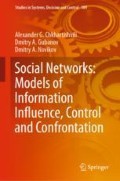Abstract
In this chapter, we develop and study game-theoretic and optimization models and methods of informational influence and control in social networks.
Access this chapter
Tax calculation will be finalised at checkout
Purchases are for personal use only
Notes
- 1.
The matrix analysis of the structure of resulting influences was performed by N.A. Korgin, Dr. Sci. (Eng.).
- 2.
The networks and opinion dynamics in this and some other examples below were obtained by simulation modeling.
- 3.
In reflexive game theory [168], the actions of different subjects are often determined by their awareness (available information). Therefore, assuming this dependence known, we can pass from the Principal’s preferences that depend on agents’ actions (which seems quite natural) to the Principal’s preferences that depend on the awareness (i.e., opinions) of the agents.
- 4.
Naturally, the relationship between the influence level and reputation can be defined in another way, with the properties of partial monotonicity and transparent interpretations in applications (see the discussion below).
- 5.
Under manipulation we understand a purposeful formation of opinions for social network participants, i.e., informational control. A negative connotation of this term is not supposed, i.e., manipulation is considered ethically neutral. The second (close) meaning of the term “manipulation” is the distortion (mispresentation) of any information reported by an agent (also see below).
- 6.
The process of exchanging opinions among social network members that results in some collective opinion can be interpreted as expertise.
- 7.
The operation of a social network can be considered in two time scales, fast (in which the opinions of all network members on a fixed issue are converging) and slow (in which the network members are sequentially discussing different issues).
- 8.
To be more exact, this formula implies prediction for opinions exchange.
- 9.
Normalization of individual reputations by the total one leads to a Markovian model in which the probabilities of steady states are defined by the relative reputations of corresponding agents. A steade state is a collective decision that coincides with the opinion of some agent.
- 10.
If each agent adheres to truth-telling, reflexion makes no sense.
- 11.
Note that such goals of agent’s behavior differ from the ones in active expertise models (an agent wants the resulting opinion to match his actual opinion, not the reported message).
- 12.
A more intellectual player at least expects that the other agents-players may perform reflexion.
- 13.
The anonymized data for this study were provided by DSS Lab (dss-lab.ru).
- 14.
The surname of the President of the Republic of Kazakhstan.
Author information
Authors and Affiliations
Corresponding author
Rights and permissions
Copyright information
© 2019 Springer Nature Switzerland AG
About this chapter
Cite this chapter
Chkhartishvili, A.G., Gubanov, D.A., Novikov, D.A. (2019). Models of Informational Control in Social Networks. In: Social Networks: Models of Information Influence, Control and Confrontation. Studies in Systems, Decision and Control, vol 189. Springer, Cham. https://doi.org/10.1007/978-3-030-05429-8_2
Download citation
DOI: https://doi.org/10.1007/978-3-030-05429-8_2
Published:
Publisher Name: Springer, Cham
Print ISBN: 978-3-030-05428-1
Online ISBN: 978-3-030-05429-8
eBook Packages: Intelligent Technologies and RoboticsIntelligent Technologies and Robotics (R0)

